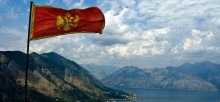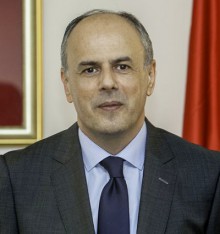May 21 marks a very important event in Montenegrin history. Back in 2006 on that date, a referendum on national independence and withdrawal from the federation with Serbia took place, with 55.4 percent Montenegrins saying yea. After 88 years of being part first of the Kingdom of Yugoslavia (1918) and then the Socialist Federal Republic of Yugoslavia (1945), there emerged a sovereign state of Montenegro in Southeastern Europe.
Montenegro was formally admitted to NATO on June 5, 2017, as the Alliance’s 29th member. This year, the European Union proclaimed it the main candidate member before the year 2025.
How did Montenegro make its Euro-Atlantic breakthrough? Could this country help Ukraine with its EU and NATO membership? More on this in the following interview with Mr. Ljubomir MISUROVIC, Ambassador Extraordinary and Plenipotentiary of Montenegro to Ukraine.
Montenegro is way ahead of the other EU candidate members from the Western Balkans and can actually be admitted in seven years. Last year, your country joined NATO after having carried out a number of quick and important reforms affecting various social spheres. How do you think Ukraine could use your Euro-Atlantic integration experience?
“Montenegro apparently has more than one reason for feeling satisfied with its European integration, and there is a loud and clear signal from the European Commission’s Strategy for the Western Balkans that this region has European prospects, that our reforms are showing results, and that European values add to our well-being and stability. In this context, I’d like to express my satisfaction with the European Union adhering to the regatta principle, whereby progress made by each country is assessed on an individual basis, and that it determines Montenegro’s resolve to continue intensive reforms and further the dynamics of the talks.
“Today, Montenegro is a country with the most open aspects to the talks with the EU. This fact is especially important, considering that my country is listed as a candidate member within a timeframe until 2025, when we’ll be supposed to have prepared for this membership – although we could do it earlier, if we show the required results.
“Montenegro’s admittance to NATO last year was proof that we’d met our partners’ expectations in terms of reform, and that this confidence would have a tangible impact on our EU integration. Ukraine and Montenegro are both obviously determined to join the European community of nations – to which they actually belong. Our political priorities are also clear cut: European and Euro-Atlantic integration. Montenegro is prepared to share its recent defense sector reform and current European integration experience with Ukraine, considering your own European integration policy.
“Montenegro was admitted to NATO as its 29th member last June. That event marked a major success of my country since the proclamation of its national independence, as a result of a strained and determined effort, along with reforms and complying with the Alliance’s high standards. Any other candidate member must pass through a similar process, and the same is true of all partners of the Alliance that wish to enhance their cooperation.
“As the newest NATO member, Montenegro resolutely supports the open door policy aimed at expanding and strengthening cooperation with all like-minded partners – above all, with those that are prepared to and capable of carrying out the required reforms and adopting the required standards. Our NATO membership is graphic proof of the use of such reforms, and the loudest and clearest signal that fulfilling such tasks is duly rewarded. We can help Ukraine by sharing information and our experience relating to reforms in the defense and other sectors that can help Ukraine enhance its cooperation with NATO and make the life of your people easier.”
An agreement on cooperation in combating man-made and natural disasters was signed by Ukraine and Montenegro two years ago. Last year, a Ukrainian firefighting plane took part in a rescue operation on the Montenegrin coast. Do you think that this agreement works?
“Montenegro and Ukraine have traditional neighborly relationships and this agreement is further proof of our solidarity and mutual assistance. We hope to keep it that way. Last July’s disasters and fires demonstrated that Ukraine fully respects this agreement and was the first to send an Antonov firefighting plane and help stabilize the domestic situation. We are very grateful to you.”
The relationships between Ukraine and Montenegro are showing dynamic progress in other spheres. Last year, the Verkhovna Rada ratified a bilateral agreement on cooperation in terms of education and science. How is it working?
“By signing that agreement, we furthered our neighborly relationships and upgraded contacts between our higher schools, personnel training, management, and planning. This includes participation, by members of the Montenegrin and Ukrainian academic communities, in workshop seminars, conferences, symposiums, student and teaching staff exchange programs, exchanging scholarly publications, and sharing academic data.”
Strange as it may seem, people in Ukraine and Montenegro, especially the younger generation, appear to know very little about both national cultures. This is especially true of the modern cinema. Take your movie The Kids from Marx and Engels Street or the Ukrainian[-Slovak] production Mezha. I think that both would be watched with interest, in both countries. Any plans for stepping up cultural cooperation between Montenegro and Ukraine?
“We’re aware of the role of the arts as a universal language that has no lingual or geographic frontiers. We’re working on furthering our bilateral relations in the cultural sphere. Diplomatic missions are geared to link various social contexts and exchange universal and historical values by using cultural means. The movie you’ve mentioned has become Montenegro’s calling card in the filmmaking domain and its producers will be happy to have it screened in Ukraine as soon as practically possible. The same relates to your film.”
Ukrainian tourists on Montenegrin beaches are traditionally a key trend in our bilateral business cooperation. How about ski resorts, active recreation, and medical tourism?
“Montenegro is very popular with Ukrainian tourists. Proof of this is the 2017 resort season statistics: some 70,000 Ukrainian tourists. Besides being well known as a summer resort, Montenegro can offer top quality winter tourism. We have five ski resorts in the south, among them Zabljak and Kolasin that match every regional standard in terms of ski routes. There are also new tourist business trends, including ski resorts, medical tourism, conferences, forums, and green tourism. I know that they’re getting increasingly popular in Ukraine.”
The free trade agreement between Ukraine and Montenegro was signed six years back. There have been more Ukrainian goods supplied to your country over the past several years, including candies, sugar, and vodka. How come we can’t buy your well known products, such as rakia, Njeguski prsut, cheeses, and wines in Ukraine? What are the prospects of this agreement?
“One of my Embassy’s priorities is securing business cooperation. Gradual trade growth was registered in 2017. According to the Chamber of Commerce and Industry of Montenegro, the trade turnover with Ukraine amounted to 9.4 million euros that year, including 8.6 million worth of Ukrainian imports. It was twice the amount registered the previous year. There were exports worth 0.9 million euros, compared to 52.2 thousand euros in 2016. This is further proof that Montenegrin products aren’t adequately represented on your market. We’re glad that Ukrainian importers are interested in our country, just as Montenegrin suppliers are working hard to establish business contacts with Ukraine. I hope that our goods will hit your supermarket shelves before long, and that Ukrainians will be able to enjoy genuine Montenegrin products.”
Thanks for your time, Mr. Ambassador. Let’s hope that our countries will implement all their plans to raise their bilateral cooperation to a new, larger scale level.
P.S.: Several days ago, Podgorica hosted the first Montenegro-Ukraine political consultations. The Ukrainian delegation was headed by Deputy Foreign Minister Vasyl Bodnar.
According to the Ministry of Foreign Affairs of Montenegro, in the course of a meeting between the Ukrainian side, the Ministry’s State Secretary, and Ambassador Zoran Jankovic, both sides reaffirmed their long neighborly relationships and that there is a fresh opportunity of upgrading their cooperation in a number of spheres, primarily in terms of business and tourism. A number of agreements are being drafted and discussed. Euro-Atlantic integration was also on the agenda and Montenegro expressed its willingness to help Ukraine and share its experience. Top level official visits to both countries are being considered, in order to upgrade the political dialog.
RTCG reports that Ukrainian Deputy Foreign Minister Vasyl Bodnar met with Deputy Speaker Genci Nimanbegu, Chairman of the Friendship with Ukraine Group in parliament.









